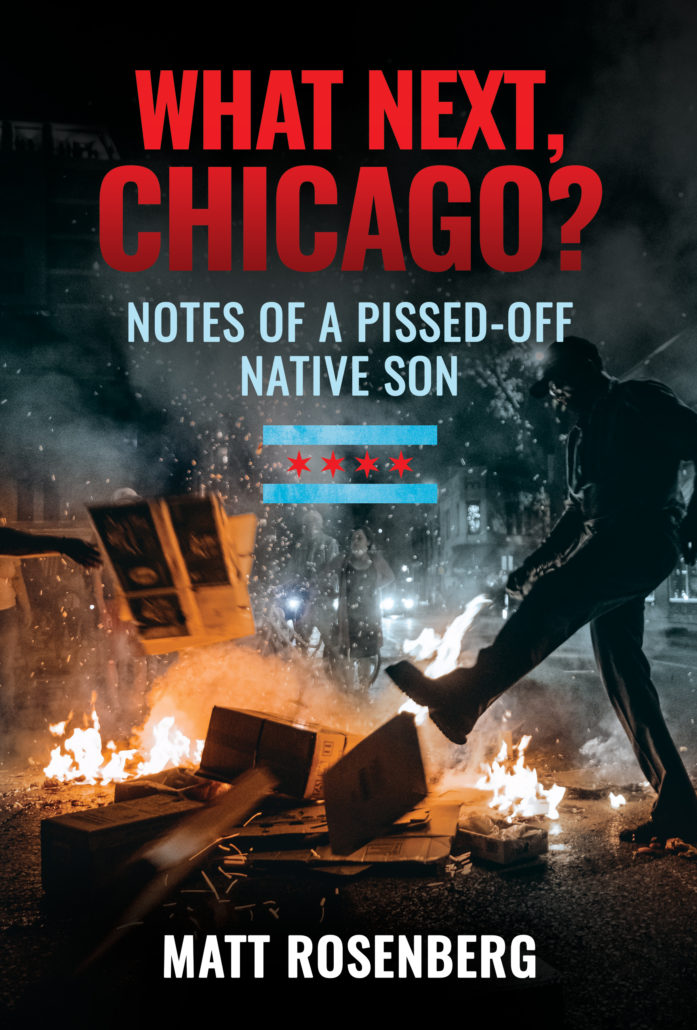In the fall of 2020, amidst riots, looting, and an alarming uptick in senseless killings, journalist Matt Rosenberg returns to his native Chicago to see if the city can dig itself out of the hot mess it’s become after decades of liberal governance.
Our nation’s big cities are broken. Urban progressive government badly undermines those it claims to lift up. Matt Rosenberg lived in Chicago for thirty years, and came back to live there again amidst the turmoil of 2020. What Next, Chicago? Notes of a Pissed-Off Native Son exposes the roots of Chicago’s violent crime, failing courts and schools, rotten finances, and ongoing Black exodus, and proposes a rescue plan for this emblematic American city.
“What has happened to Chicago? That’s Matt Rosenberg’s question, and mine as well. His loving tribute to our hometown is a moving, sensitive, humane and trenchant critical assessment. Read it and weep.”
– Glenn C. Loury, Merton P. Stoltz Professor of the Social Sciences, Brown University. Author of “One By One from the Inside Out: Essays and Reviews on Race and Responsibility in America.” Host of The Glenn Show at substack.com.
“Matt Rosenberg writes about the Chicago Way in the Chicago Style of a Mike Royko…It’s a coherent, honest and balanced tour of the city’s perpetual corruption, unsafe streets, gawd-awful schools, ghost neighborhoods, financial legerdemain and the false Unified Theory of Systemic Racism that cloaks it all. Yet, What Next? is no helpless, hopeless wail, but a powerful and useful roadmap for a rebirth of a once-great city, based on the voices of Black families and others who don’t need academia to know what to do. Must reading for Chicago lovers.”
– Dennis Byrne, former Chicago Sun-Times editorial board member. Author of “Madness: The War of 1812.”
“Not since author Alex Kotlowitz ventured into Chicago’s Henry Horner housing projects has an author offered such a thoughtful and thorough first-hand analysis of the state of urban disrepair. Leaders from cities across America would be well served by reading Matt Rosenberg’s account of what’s happening in Chicago and how not to make some of the same mistakes.”
– Cyrus Krohn, former Publisher, Slate.com, author of “Bombarded: How to Fight Back Against the Online Assault on Democracy.”
“Matt Rosenberg came of age in Chicago…and “What’s Next, Chicago?” is about his return…to see for himself what’s gone so terribly wrong in the town once regarded as America’s model metropolis. The answer…is…cronyism on a gargantuan scale. Endless race hustling of the ugliest kind. An education system that has given up on the underclass. Corruption (that’s) deep and intractable…But Rosenberg’s scrupulous investigation is full of unexpected turns, and along the way he encounters those of every station who offer at least some reason for hope. Indeed, notwithstanding his clear-eyed record of the city’s decline…his love of the city and its people shine through this brave and important book.”
– Harry Stein, author, “Why We Won’t Talk Honestly About Race.”
“Matt Rosenberg digs deep into the reasons why a city with such a strong economy can nonetheless lose its moorings. His take on Chicago’s politicians, schools and crime rates is caustic and impossible to ignore…Rosenberg’s chapters grab hold of you, again and again, as he ranges across the most ravaged neighborhoods of the South Side, appreciating the never-quit determination of barbers, donut stand operators and gang members turned Uber drivers.”
– George Anders, Senior Editor-at-Large, LinkedIn, and author of “The Rare Find: How Great Talent Stands Out.”
“In a gripping account of how bad things have gotten in Chicago, Matt Rosenberg tells us what this portends for the rest of the country. You can’t put the book down.”
Frank Buckley, Foundation Professor, Scalia Law School, George Mason University, Author of “Curiosity—And Its 12 Rules for Life.”
The book begins with a searing look at the steady drum-beat of crime that has afflicted Chicago in the last two (pandemic years), punctuated by rioting, looting, and worse in the name of “protest”. It broadens into sharp and concise histories and analyses of political and other conditions that underlie the mess, among them: pervasive corruption; racialist politics on all sides; the intellectual decay represented by “wokeism;” the decades of academic and cultural deconstruction that have led to the rise of BLM and other follies; a rotten school system; a journalistic fraternity that is, at best, indifferent to the realities of the society on which it purports to report; public sector taxing and spending that undermine the health of the community.
Mr. Rosenberg does not spare leading figures in this history, including two Mayors Daley, Mayor Emanuel, Mayor Lightfoot, State’s Attorney Foxx, and others. Memoirs of his family’s history and his own Chicago upbringing and activist career lightly leaven the book, adding context and evidencing his credentials to supply a fierce critique of a city he knows and loves intimately. The book is highly readable, written in a contemporary style as is suggested by its title, but is supported by a rich inventory of endnotes that document his narrative and provide further information and ammunition for anyone wishing to be able to comment knowledgeably about Chicago’s woes and prospects.
